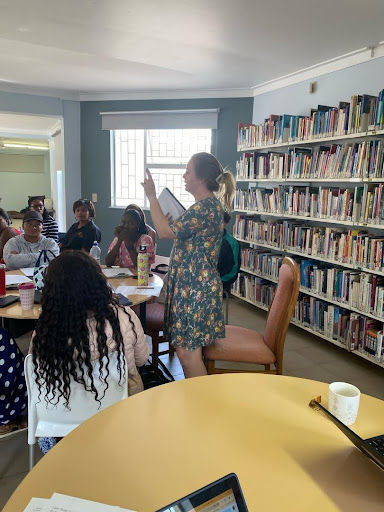An International Baccalaureate Authorisation Update From Our MYP Coordinator
- Windhoek International School
- Dec 1, 2023
- 6 min read
With the IB MYP Consultation Visit taking place on 4-5 December 2023, WIS is taking its next step in the International Baccalaureate’s Middle Years Programme Authorisation and Implementation Process
Dear Parents,
The International Baccalaureate Organisation (IBO) has a well-worn path for schools who wish to become an IB school or, in our case, who intend to add the Middle Years Programme (MYP) to our already-existing PYP and DP programmes, in order to become an IB Continuum School.
An important step in this journey is the “IB MYP Consultant Visit”. This will take place on Monday and Tuesday 4-5 December, 2023, so now is a timely moment to provide a detailed update of where we are with the implementation of the IB Middle Years Programme at WIS.
Purpose of Consultation Visit
Consultants are IB-trained members of the international school community who work with schools and provide external validation of the programme authorisation process. The purpose of this visit is to determine whether the school is prepared for a full MYP Verification Visit (that grants us full accreditation status).
It is important therefore to understand that the Consultant Visit is part of the preparation process. The evaluation and authorisation will come later. We will be using this visit to provide us with some objective feedback for us to action on - and also to give us insights into various stakeholder perspectives.
Purpose of an MYP Curriculum
This semester has been a very busy semester for the MYP at WIS. Teachers have been busily building the units and creating assessments that match a growing understanding of what we are trying to achieve. To get to this point there has been a significant investment in training. All MYP teachers have attended subject specific training run by the IB (mostly online). In addition all MYP teachers have had a one-to-one training session that I ran to ensure that the MYP approach embeds every aspect of teaching and learning here at WIS.
In explaining it to staff in the most succinct and transferrable manner, it occurred to me that it could be captured in a single image:

We believe at WIS that what matters is that our graduates are knowledgeable in all of the subject domains and skillful in their outworking of that knowledge. We also believe that content and skills alone is not enough. To give them wings we need to ensure that the learning builds meaning and feels relevant.
Meaning-making happens when students connect content to bigger ideas that surround them. Relevancy is built by embedding the content in real-world situations.
This happens through explicit case studies of where what is being learned matters. The IB MYP framework allows learning new knowledge and skills to have a purposeful challenge for our students.
The IB MYP Unit Plans are being designed and implemented, and we are starting to see the results take flight.
Building for Sophistication
Whereas the IGCSE focuses on knowledge and skills alone, MYP units of study are designed in a way that uses these to develop a deeper understanding of real-world situations. Whilst being incredibly proud of what we have so far achieved and where we are going, we are aware that this is not an overnight process.
Along the way, as we have reflected on how to modify our curriculum, we have been looking at our assessments. On reflection we are seeing that our existing assessments have oftentimes been somewhat artificial and disconnected from applying important knowledge and skills to real things happening. We are working towards making our tasks more relevant to the world and increasing the rigor behind what students will know and be able to do by the time they leave Grade 10.
We have seen that some of our MYP assessments, thus far, were viewed as a series of subtasks along the way to a finished product (with each subtask contributing to a greater score). We are trying to shift this perspective towards seeing progression in terms of the increasing sophistication of thought and expression. In the early 1960s Bloom's taxonomy of thinking skills was created which has informed the idea of what sophisticated thought looks like. It is more than just a completion of tasks; it is a means of articulating understanding.

By focusing on the development of the command terms we are uncovering that the students need significant extra support to communicate in the higher levels of Bloom's hierarchy.
Building Vital Skills (in particular, Written Communication)
This brings me to the biggest discovery of our curriculum review. WIS kids need significant support in writing well. This discovery is not a new MYP thing. This is not a new problem for WIS. This was present in the IGCSE, but until this review it wasn't being identified or tackled. It is my belief that by directly addressing our written communication skills, we will give students the ability to conduct the deeper levels of understanding and analysis required for success in the IB DP (Diploma Programme) and then later in university and in life.
The MYP offers us the chance to address this. The IB has a set of skills which they refer to as Approaches to Learning (ATLs). Our summative assessments are aligned with these ATLs. For example, if the summative performance is a presentation then we teach how to do a good one; if the performance is a persuasive essay then we are teaching how to write one.
One of the school’s main priorities for the 2023-24 school year is to explicitly teach writing across the curriculum. We are doing this in the PYP through the MYP (and present Grade 10 IGCSE) and into the IBDP. We are hard at work in this area and there is more to do. We have begun with creating and using structured writing frames that support student writing, such that students can better articulate their ideas. We are using strategies suggested by our visiting literacy expert Stephan Graham. This will remain an area of intense focus.
As other skills deficits emerge we are committed to, in the same vein, building a strategy to support developmental progression in each identified critical skill. Right now as I write this the homeroom teachers are focussed on developing reflective writing skills for the forthcoming reports.
Developing good learning strategies
At the end of the DP students sit examinations, in which grades are awarded mostly on their performance in these. At the end of MYP5 there will be an eAssessment examination that likewise will determine grades. We are not ignoring that students must not lose the skill of having to understand and memorise content if they want to learn something (as I tell my classes, the difference between understanding and learning is ‘not forgetting '). Understanding and employing effective study skills is essential to success.
As a result, we are going to implement end-of-year examinations at the end of each MYP grade level (details to follow in the new calendar year).
Further to that we have purchased a new tool that will support the creation of tests that can be completed online (we hope this will reduce the photocopy bill, preserve the environment better and improve our ability to set tests that promote higher level thinking not just recall). It is called “AssessPrep” and it is designed in a way that is highly similar to the layout and functionality of the MYP eAssessment itself.
Making a difference
The above is, I believe, a fair synopsis of the position we are in academically. As an IB school, literacy cannot be our only focus. Developing an MYP programme gives us the chance to reflect on how service can be more integrated and how we can teach students that they can actually take action and make a change. Already Ms Ruth Suffield and the Middle School Team have helped the grade levels develop meaningful service opportunities. These are going to be some of the important conversations we will be taking further next year.
We are looking for ways that service can connect to the Outdoor Education we plan and to the homeroom curriculum that is being developed. We want to expose students to real-world issues that they can champion through the use of Interdisciplinary Units (multiple subjects giving input on a problem in the world) and opportunities for them to act. One such opportunity will be the personal project that Grade 9s will begin in the late summer and complete in Grade 10 (parents - no need to worry about this - more details will come in January, together with a parents' evening launch).
Change and adaptation
Through half-day curriculum planning sessions, co-planning after school, and 1:1 consulting, we are working to create a high-quality, guaranteed, and viable curriculum. An approach to curriculum and assessment that will make the teaching and learning process something that is purpose-filled and 100% engaging. It is a lot of work, and I am thankful to our teachers for going above and beyond as they do this in addition to all of their other daily responsibilities.
In addition to all the above changes so too our learning platform changed. ManageBac has allowed us to get some better monitoring of performance in criteria assessments. It is streamlining our reporting process. It has helped us identify more issues of plagiarism. It has helped us take attendance throughout the day and notify parents when students fall behind. (These are some, not all, of the benefits). That said, it is also a new system and so we will review our policies and procedures to give a more consistent usage experience to students and parents.
Thank you for reading this far. This has been a deliberately comprehensive account of where things are at in the MYP rollout and plans moving forward. As someone who has been teaching and administering the MYP for many years, I can say that I am confident that WIS is on track to gain the IB’s decision on authorization as planned and within the 2024 calendar year.
May I take this moment to wish families a Merry Christmas and I hope you can all come back refreshed to the new year.
Seasonal regards,
Adrian von Wrede-Jervis








Comments